Lee: Amit, thank you for taking the time to chat with us today. To begin, could you tell us a bit about your journey and how you got started in the field of IT?
Amit Lokare: Thank you for having me, Lee. My journey in IT started right after I completed my Bachelor’s degree in Information Technology from VESIT, Mumbai. In the early years, I was drawn to web technologies and cybersecurity. I started by working on small web projects and gradually moved to larger, more complex systems. As I learned more about cloud technologies, especially Office 365 and SharePoint, I realized that this was where the future was headed, so I focused on that. Over the past 19 years, I’ve had the opportunity to work on a range of projects, from cloud migration and enterprise rollouts to cybersecurity and cloud-based identity management, which helped shape my career.
Lee: That’s an impressive journey. What has been one of the most exciting projects you’ve worked on so far?
Amit Lokare: One of the most exciting projects I’ve worked on was the O365 enterprise rollout for Vanguard. It was a huge undertaking, as we had to transition over 25,000 users to a cloud-based system. This involved migrating legacy systems, setting up security frameworks, and implementing a variety of tools like Microsoft Teams, SharePoint, and Power Platform. The sheer scale of the project and the impact it had on the organization made it an unforgettable experience. It was rewarding to help the company not only modernize its infrastructure but also save costs by retiring outdated systems.
Lee: That sounds like quite the challenge, but also a great accomplishment. You’ve worked with numerous clients and technologies over the years. How do you stay on top of all the changes in the fast-paced tech landscape?
Amit Lokare: It’s definitely a challenge, Lee. Technology evolves rapidly, and it’s crucial to stay updated. For me, continuous learning has always been a priority. I regularly take new courses and certifications—like my AWS Solution Architect and Microsoft Certified Professional certifications—to keep up with the latest developments. I also make a point to read industry blogs, attend webinars, and participate in forums. But beyond that, hands-on experience is key. I find that working on real projects, collaborating with my teams, and trying new solutions helps me understand how new technologies fit into the bigger picture.
Lee: You mentioned working with cloud technologies and cybersecurity. Can you tell us more about your experience with securing cloud systems?
Amit Lokare: Security is one of the most critical aspects of any cloud solution, and I’ve worked extensively in this area. For example, in the CREDaaS Modernization Project at Vanguard, I was deeply involved in ensuring that security was built into the core of the cloud architecture. This involved integrating third-party security tools like Splunk and Proofpoint and configuring conditions for access policies. In addition, I worked on implementing Data Loss Prevention (DLP) and multi-factor authentication protocols to safeguard sensitive data. It’s all about adopting a security-first mindset and ensuring that the entire ecosystem, from user identity to data, is protected at all times.
Lee: It’s clear that you’ve built a strong foundation in security. How do you approach problem-solving when faced with a complex technical issue?
Amit Lokare: When I’m faced with a technical problem, my first step is always to break it down into smaller, more manageable parts. I believe in understanding the root cause of the issue before jumping into a solution. I also collaborate with my team to get diverse perspectives. Sometimes the best solutions come from brainstorming with others. Once we’ve identified the problem, I prioritize simplicity in the solution. Complex problems often benefit from simple, well-structured solutions. And if the problem is particularly tricky, I turn to testing and prototyping to find a workable solution before moving to production.
Lee: That’s a great approach. Looking ahead, what do you see as the biggest trends shaping the future of IT?
Amit Lokare: I think cloud computing will continue to dominate, especially as more businesses move to the cloud to scale and reduce costs. Hybrid and multi-cloud environments will become the norm, with organizations looking for flexibility and redundancy. Additionally, AI and machine learning will play a bigger role in automating IT operations and enhancing security. We’re already seeing how AI is being used to predict potential threats and automate routine tasks. Finally, cybersecurity will remain a top priority, especially with the increasing volume of data and the shift to remote work. Protecting sensitive information in a cloud-first world is going to be an ongoing challenge.
Lee: It’s exciting to hear your insights on the future of IT. As someone who has been a leader in your field, what advice would you give to someone starting out in IT today?
Amit Lokare: My advice would be to stay curious and be adaptable. The tech world changes fast, and being open to learning new technologies is crucial. Try to specialize in something that excites you, whether it’s cloud computing, AI, cybersecurity, or something else. But remember, technical skills are only part of the equation. Communication and problem-solving skills are just as important. The ability to explain complex ideas to non-technical stakeholders and work well within a team will help set you apart in this field. And finally, don’t be afraid to take on challenging projects. It’s those experiences that will shape your career and help you grow.
Lee: Fantastic advice, Amit. Before we wrap up, could you share a little about what motivates you in your work?
Amit Lokare: I’m motivated by the opportunity to make a difference. I love working on projects that have a tangible impact on an organization, whether it’s helping them migrate to the cloud, secure their systems, or improve their workflows. It’s incredibly fulfilling to see the results of your work and know that you’ve made processes easier, more efficient, or more secure. I also enjoy mentoring others and seeing them succeed in their careers. At the end of the day, it’s about creating solutions that solve real problems and make people’s lives easier.
Lee: Thank you again for sharing your journey and insights with us, Amit. Your passion for technology and dedication to excellence are truly inspiring.
Amit Lokare: Thank you, Lee. It’s been a pleasure speaking with you. I appreciate the opportunity to share my experiences, and I’m excited to see where technology takes us in the future!



































